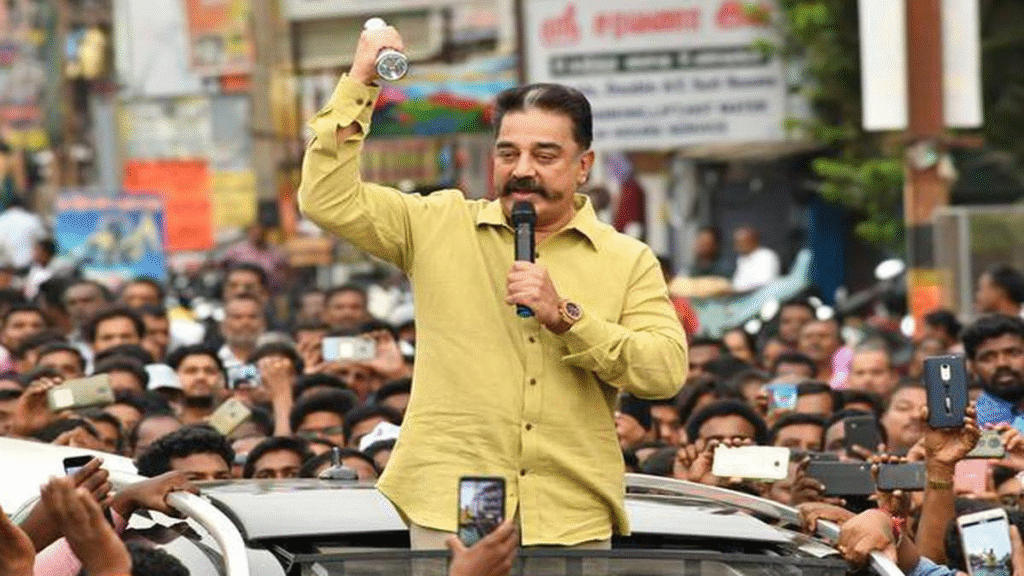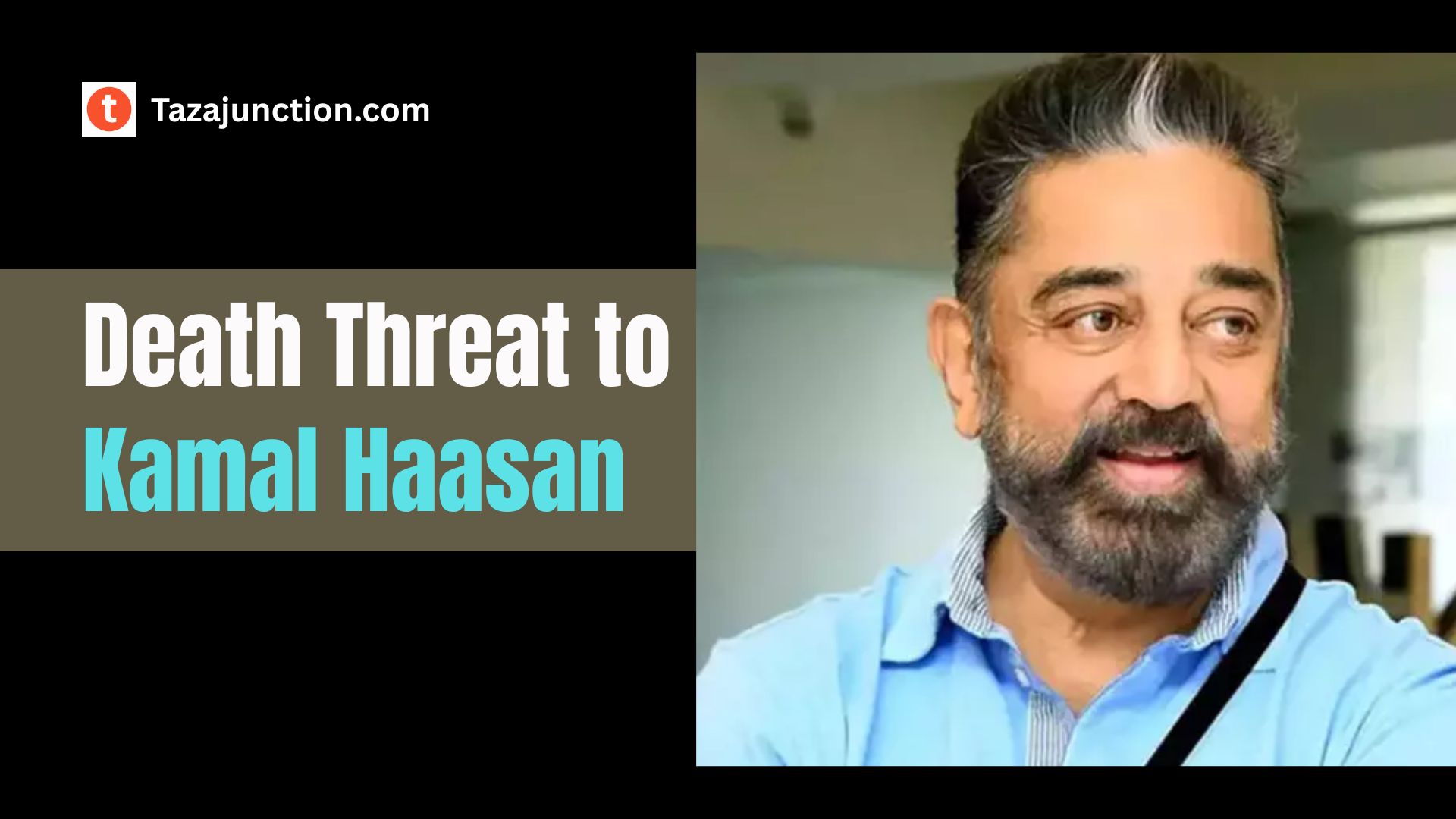A major controversy has erupted in South Indian cinema. A well-known television actor, T. Ravichandran, has been accused of issuing a death threat to Kamal Haasan.
The incident unfolded after the veteran actor and political figure made a comment regarding Sanatana Dharma, triggering backlash from certain religious and political circles. Ravichandran’s fiery response, which allegedly included threats of violence, led to an FIR filed by the Central Crime Branch.
In response, the actor has now moved the Madras High Court seeking anticipatory bail. The death threat to Kamal Haasan has not only sparked public outrage but also renewed debates around freedom of speech, digital responsibility, and legal boundaries in political discourse.
This TazaJunction.com article explores the details of the incident, the legal arguments, and its broader implications.
Table of Contents
The Trigger: Kamal Haasan’s Remarks and the Escalation
The death threat to Kamal Haasan followed his remarks made during the 15th anniversary of the Agaram Foundation. Speaking at the event, Haasan remarked that education is the only weapon capable of breaking the “chains of Sanatana Dharma.” These comments did not sit well with certain right-wing factions and individuals in the entertainment industry.
In response, T. Ravichandran gave a heated interview where he criticized Haasan’s stance and allegedly threatened him by stating he would “slit his throat” if such views continued. This violent statement quickly went viral, turning what could have been a political disagreement into a legal crisis.
Legal Fallout: Complaint, FIR, and Bail Plea
Following the death threat to Kamal Haasan, a formal complaint was lodged by A.G. Mourya, vice-president of Makkal Needhi Maiam and a retired IPS officer. The complaint was filed with the Greater Chennai Police Commissioner and then escalated to the Central Crime Branch (CCB), leading to an FIR against the TV actor.
With the legal pressure mounting, Ravichandran applied for anticipatory bail in the Madras High Court. His legal team argued that the statement was made impulsively and without intent to cause harm.
They also highlighted the fact that he was unaware of the FIR until after media reports broke the story, suggesting a lack of due process.
The High Court’s Role in the Case
The Madras High Court’s role is pivotal in deciding whether anticipatory bail should be granted in the death threat to Kamal Haasan case. Justice G. Jayachandran, presiding over the matter, has directed the government counsel to gather inputs from the Central Crime Branch before proceeding further. A hearing is scheduled for August 20.
In cases like this, the court evaluates the credibility of the threat, the public impact, and the legal definitions under sections of the IPC. While freedom of expression is a constitutional right, issuing a death threat to Kamal Haasan or any other public figure is a criminal offense under Indian law.
Free Speech vs Threats: Drawing the Line

This incident has reopened national debates on where the line should be drawn between free speech and criminal conduct. While public figures like Kamal Haasan often voice strong, polarizing opinions, responses like a death threat to Kamal Haasan cross legal and ethical boundaries.
Public discourse must be robust but respectful. Whether Ravichandran’s words were emotionally charged or a legitimate threat, the law must treat any death threat to Kamal Haasan as serious and investigate thoroughly to maintain order and uphold public safety.
Impact on Kamal Haasan’s Public Role
Though not directly involved in the case’s legal proceedings, Kamal Haasan is at the center of its fallout. The death threat to Kamal Haasan has prompted calls for increased personal security and protection for the actor, especially as he remains active in both the film industry and political spheres.
As the founder of Makkal Needhi Maiam, Haasan is no stranger to controversy. But a death threat to Kamal Haasan over ideological differences is a grim reminder of how political tensions can escalate dangerously when not handled responsibly by all parties involved.
Consequences for Ravichandran
If the High Court denies anticipatory bail, Ravichandran could face arrest and criminal prosecution. Even if bail is granted, he may be restricted in his public interactions or online activity. The death threat to Kamal Haasan has already damaged his public image, and legal proceedings could result in career consequences as well.
His defense will likely hinge on showing the lack of malicious intent behind the comments. However, the judicial system will scrutinize the video footage, public reaction, and the timeline surrounding the death threat to Kamal Haasan before reaching a conclusion.
Industry and Political Reactions
The death threat to Kamal Haasan has drawn reactions from across the entertainment and political landscape. While many have condemned Ravichandran’s comments, others have criticized Haasan’s remarks as needlessly provocative.
This clash reveals a deeper cultural and ideological divide within the Tamil Nadu public space, where cinema and politics are deeply intertwined. Yet, no matter the views held, issuing a death threat to Kamal Haasan is not protected by any political allegiance or free speech defense.
Social Media’s Role in Amplifying Threats
One key aspect of the controversy is how rapidly the death threat to Kamal Haasan spread online. Ravichandran’s video, once uploaded, was shared widely across platforms, igniting outrage but also support from fringe elements.
The episode underscores how social media acts as both amplifier and record-keeper. A verbal outburst that may once have stayed local now has nationwide—and even international—ramifications. Digital accountability, especially for public figures, is now a non-negotiable reality.
Final Verdict: Awaiting Judicial Clarity
The legal outcome of this case could set important precedents. Will the High Court consider the death threat to Kamal Haasan as a moment of emotional excess or a punishable offense? The decision will influence not only Ravichandran’s future but also how society handles hate speech, political rivalry, and celebrity opinion.
Whatever the verdict, the death threat to Kamal Haasan has stirred a meaningful discussion on the limits of expression, digital responsibility, and the price of public discourse in modern India.
Conclusion
The death threat to Kamal Haasan case serves as a mirror to our societal tensions, legal frameworks, and cultural expectations. As a celebrated actor and political voice, Kamal Haasan’s freedom to speak should be respected—but so should the laws protecting individuals from violence.
Ravichandran’s actions, now under legal scrutiny, will be judged not just by words spoken, but by the intention, context, and public impact.
All eyes are now on the Madras High Court as it prepares to decide whether freedom of expression was misused or criminal law was broken.

